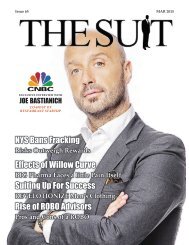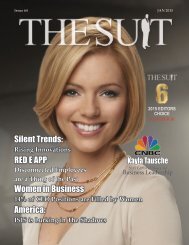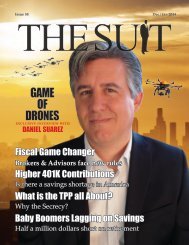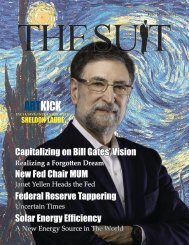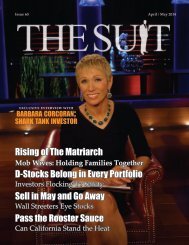o_19grqq7snim9mn019q11f7ds26a.pdf
Marcus Lemonis, a serial entrepreneur and host of the show “The Profit” on CNBC, is a true survivor in the corporate world. The native-born Lebanese business man endured the chaos of a civil war in Beirut and eventually moved to Miami. Lemonis was exposed to the automotive industry throughout his upbringing - his grandfather owning two of the largest Chevrolet dealerships in the United States and Lee Iacocca serving as the family friend and later mentor to Lemonis. On page 12, we conducted an interview with “Profit” host Marcus Lemonis, who offers struggling small businesses capital investment and his expertise in exchange for an ownership stake in the company. In the latter part of the magazine, we interviewed countless wealth advisors during these tough economic times. We recognize that some of the changes in 2013 and 2014 require relevance for financial planners. Therefore, the financial industry continues to push for more realistic standards and reforms.
Marcus Lemonis, a serial entrepreneur and host of the show “The Profit” on CNBC, is a true survivor in the corporate world. The native-born Lebanese business man endured the chaos of a civil war in Beirut and eventually moved to Miami. Lemonis was exposed to the automotive industry throughout his upbringing - his grandfather owning two of the largest Chevrolet dealerships in the United States and Lee Iacocca serving as the family friend and later mentor to Lemonis. On page 12, we conducted an interview with “Profit” host Marcus Lemonis, who offers struggling small businesses capital investment and his expertise in exchange for an ownership stake in the company. In the latter part of the magazine, we interviewed countless wealth advisors during these tough economic times. We recognize that some of the changes in 2013 and 2014 require relevance for financial planners. Therefore, the financial industry continues to push for more realistic standards and reforms.
Create successful ePaper yourself
Turn your PDF publications into a flip-book with our unique Google optimized e-Paper software.
Brave Investing During a Sell-Off Pays Dividends<br />
Market Volatility is no Reason to Shy away from Further Investing<br />
It’s no secret that, when Warren Buffett<br />
talks, people listen. Everyone<br />
wants to know what investments<br />
he’s getting into – and what he’s dumping.<br />
Buffett is perhaps the modern day<br />
version of E.F. Hutton, whose famous<br />
1970s and 1980s television commercial<br />
made that version of the catch phrase<br />
infamous.<br />
Caleb Overton, CMT of Biltmore<br />
Wealth Management, LLC, based in<br />
Santa Barbara, California, has no reservation<br />
admitting that he always pays<br />
close attention to what Buffett is saying<br />
and recommending.<br />
“I follow the advice of Warren Buffet,”<br />
Overton said. “Some of the best advice<br />
Buffett has provided is to read as much<br />
as possible every day and that over the<br />
years, the accumulated knowledge<br />
will pay you great dividends.”<br />
In heeding that advice, Overton has<br />
secured a significant library of various<br />
financial investment research publications<br />
from a variety of sources, and<br />
he’s reading them every day – just as<br />
Buffett suggests.<br />
“From the information I am gleaning, I<br />
have been able to navigate the markets<br />
much better and have become an even<br />
greater asset to my clients,” he noted.<br />
For the first nine years in the financial<br />
services business, he started out by<br />
selling a mixture of financial products<br />
and providing advice on a fee-only basis.<br />
Overton hung out his own shingle,<br />
called Biltmore Wealth Management,<br />
two years ago. He made the full transition<br />
to a Registered Investment Advisor<br />
(RIA) away from commission income<br />
and his firm is now 100-percent<br />
compensated via the fee-only model.<br />
Most of his clients range in age from 40<br />
to 70 years old, and are either self-employed<br />
or are owners of small businesses.<br />
His firm’s account minimum is<br />
$100,000. Many of his clients share the<br />
same interests as he does outside of financial<br />
services. Overton believes that<br />
being able to discuss similar hobbies<br />
and interests gives him a trust-building<br />
platform from which to conduct<br />
business.<br />
He’s also a big believer in matching a<br />
client’s investment strategy to their financial<br />
goals like a comfortably-fitting<br />
glove. That’s why he designs a variety<br />
of portfolios – from conservative to<br />
moderate to aggressive – based on the<br />
individual risk tolerance of each client.<br />
Starting his financial career in 2003,<br />
Overton had a half decade of his own<br />
entrepreneurial experience before the<br />
Great Recession struck in 2008. He vividly<br />
remembers the fear his clients experienced<br />
during that time.<br />
“Clients were afraid to make any decisions,”<br />
he recalls. “They became paralyzed.<br />
They did not want to make a<br />
wrong decision so they sat back and<br />
did nothing .”<br />
“That,” Overton said, “Was not a profitable<br />
plan.” He decided to give financial<br />
seminars, to encourage clients to<br />
remain invested in the market and to<br />
take an even bolder step by not only<br />
considering, but by adding to their investments.<br />
“They needed to embrace the situation,<br />
as it provided great opportunity<br />
to buy into some great companies at<br />
very cheap prices,” Overton explained.<br />
“Times of extreme volatility within the<br />
market do present challenges to an advisor<br />
to keep calm and calm his clients<br />
as well– and teach them that yes, this<br />
is not comfortable. But you can get<br />
better returns over time if you remain<br />
invested for the long haul and take advantage<br />
when these situations present<br />
themselves. It is one of the hardest concepts<br />
to execute, but when the market<br />
has a seven to ten percent sell-off, that<br />
is the time to step in, be brave and buy<br />
a great stock at a discount during that<br />
volatility.”<br />
735 State St., Suite 207<br />
Santa Barbara, CA 93101<br />
Phone: 805-770-3777<br />
www.biltmorewealth.com<br />
THE SUIT MAGAZINE - JULY 2014




